-
 Bitcoin
Bitcoin $115000
0.12% -
 Ethereum
Ethereum $3701
4.50% -
 XRP
XRP $3.081
2.99% -
 Tether USDt
Tether USDt $0.0000
-0.01% -
 BNB
BNB $767.9
1.45% -
 Solana
Solana $169.5
3.13% -
 USDC
USDC $0.9999
0.01% -
 Dogecoin
Dogecoin $0.2106
4.30% -
 TRON
TRON $0.3334
1.62% -
 Cardano
Cardano $0.7564
2.54% -
 Stellar
Stellar $0.4165
0.76% -
 Hyperliquid
Hyperliquid $38.75
0.25% -
 Sui
Sui $3.593
3.00% -
 Chainlink
Chainlink $17.08
3.59% -
 Bitcoin Cash
Bitcoin Cash $573.6
4.35% -
 Hedera
Hedera $0.2508
-0.84% -
 Avalanche
Avalanche $23.07
6.46% -
 Ethena USDe
Ethena USDe $1.001
-0.02% -
 Litecoin
Litecoin $120.8
8.17% -
 UNUS SED LEO
UNUS SED LEO $8.943
-0.32% -
 Toncoin
Toncoin $3.400
-5.60% -
 Shiba Inu
Shiba Inu $0.00001255
1.54% -
 Uniswap
Uniswap $9.908
6.32% -
 Polkadot
Polkadot $3.718
2.10% -
 Monero
Monero $303.0
-0.74% -
 Dai
Dai $0.9999
-0.02% -
 Bitget Token
Bitget Token $4.392
0.91% -
 Cronos
Cronos $0.1403
6.31% -
 Pepe
Pepe $0.00001076
1.13% -
 Aave
Aave $267.2
1.80%
Are Coinbase's financial products principal-guaranteed? How often is the annualized rate of return updated?
Coinbase offers financial products like Staking and Savings, but they are not FDIC-insured and carry risks such as market volatility and slashing penalties.
Jun 11, 2025 at 10:43 pm
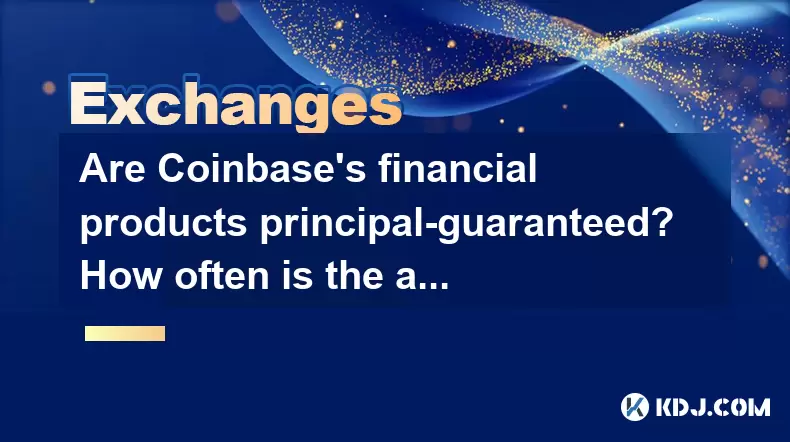
Understanding Coinbase's Financial Products
Coinbase, one of the most prominent cryptocurrency exchanges globally, offers a variety of financial products beyond basic crypto trading. These include Coinbase Earn, Coinbase Savings, and Coinbase Staking. Each product is designed to provide users with opportunities to earn passive income through different mechanisms such as staking rewards, interest from lending, or yield from savings plans.
It's important to note that none of these financial offerings are traditional banking products. As such, they do not come with principal guarantees like those found in FDIC-insured bank accounts. The risks associated with cryptocurrency investments apply to these products as well, including market volatility, regulatory changes, and liquidity issues.
Are Coinbase Financial Products Principal-Guaranteed?
The short answer is no — Coinbase does not guarantee the principal amount invested in its financial products. This applies to all investment-related features on the platform, including but not limited to Coinbase Savings, Staking, and Lending (where available).
Unlike traditional banks that may offer insurance for deposited funds, cryptocurrency platforms operate under different regulatory frameworks, and many jurisdictions do not extend deposit insurance to digital assets. Therefore, if the value of the underlying asset drops or if there's a failure in the network supporting the product, users may experience losses on their initial investment.
Furthermore, staked assets may be subject to slashing penalties if the validator node misbehaves or goes offline. While this is rare, it introduces another layer of risk that could affect the principal.
How Does Coinbase Calculate Annualized Returns?
The annualized rate of return offered by Coinbase’s financial products is typically based on network inflation rates, supply-demand dynamics, or lending market conditions. For example, when you stake Ethereum via Coinbase, your returns are derived from the Ethereum 2.0 staking reward system, which adjusts dynamically based on the total number of validators participating in the network.
Coinbase provides an estimated annual percentage yield (APY) at the time of investment. However, this APY is just an estimate and not a guaranteed return. The actual earnings can vary significantly due to multiple factors including:
- Network participation levels
- Changes in protocol rules
- Market conditions affecting token prices
Therefore, while Coinbase strives to give accurate projections, users should treat these figures as indicative rather than fixed.
How Often Is the Annualized Rate Updated?
The annualized rate of return on Coinbase’s financial products is updated regularly, though the frequency varies depending on the specific product:
- Coinbase Staking: APY updates occur daily or weekly, reflecting real-time changes in the blockchain's reward structure.
- Coinbase Lending: If Coinbase reactivates its lending program, interest rates would likely be updated periodically, influenced by supply and demand in the lending market.
- Coinbase Savings: This feature purchases cryptocurrencies on a recurring basis using fiat currency, so the "return" is tied directly to price movements, which change in real-time.
Users can check the current APY for staking or other earning programs directly within the app or website before committing funds. It is crucial to review this information periodically, especially if planning long-term participation in any earning program.
What Are the Risks Involved in Coinbase Financial Products?
While Coinbase's financial products offer potential returns, they also carry several types of risk:
- Market Risk: The value of your holdings can decrease due to price volatility in the cryptocurrency markets.
- Smart Contract Risk: Some earning products rely on smart contracts, which may contain bugs or vulnerabilities.
- Regulatory Risk: Regulatory actions could impact the availability or legality of certain financial products in specific jurisdictions.
- Slashing Risk (for Staking): Validators who fail to follow protocol rules can have their staked assets penalized.
- Platform Risk: Although Coinbase is a reputable exchange, no platform is immune to security breaches or operational failures.
Given these risks, users should conduct thorough research and only invest what they can afford to lose.
FAQs
Q1: Can I lose money by using Coinbase Staking?
Yes, although staking typically doesn't reduce the amount of coins you've staked, price fluctuations can result in a loss of value relative to fiat currencies. Additionally, slashing penalties may reduce your staked amount under certain conditions.
Q2: Does Coinbase offer FDIC insurance for its financial products?
No, FDIC insurance does not cover cryptocurrency holdings or related financial products. FDIC insurance only applies to traditional bank deposits in USD up to specified limits.
Q3: How often does Coinbase update staking rewards for Ethereum?
Staking rewards for Ethereum are updated based on the Ethereum network's performance, which means changes can occur daily or weekly, depending on network activity and validator participation.
Q4: Are there lock-up periods for assets used in Coinbase financial products?
Yes, many of Coinbase’s financial products, particularly staking, involve lock-up periods during which you cannot withdraw your assets. The length of these periods varies depending on the asset and the product, with Ethereum staking typically having variable unlock times post-withdrawal activation.
Disclaimer:info@kdj.com
The information provided is not trading advice. kdj.com does not assume any responsibility for any investments made based on the information provided in this article. Cryptocurrencies are highly volatile and it is highly recommended that you invest with caution after thorough research!
If you believe that the content used on this website infringes your copyright, please contact us immediately (info@kdj.com) and we will delete it promptly.
- Solana Memecoin Launchpads: A Wild Ride with LetsBONK.fun Leading the Charge
- 2025-08-05 17:30:12
- Crypto Volatility & Token Unlocks: Navigating the Storm
- 2025-08-05 16:30:13
- SUI Traders Eye Discount: Is Now the Time to Buy?
- 2025-08-05 16:30:13
- Bitcoin Price in August: Will the BTC Rally Continue?
- 2025-08-05 17:35:12
- Decentralized Perpetuals Soar: Volume Hits All-Time High, Leaving CEXs in the Dust?
- 2025-08-05 16:50:12
- Decoding MYCUSD: Crypto Forecasting for Digital Asset Success
- 2025-08-05 16:50:12
Related knowledge
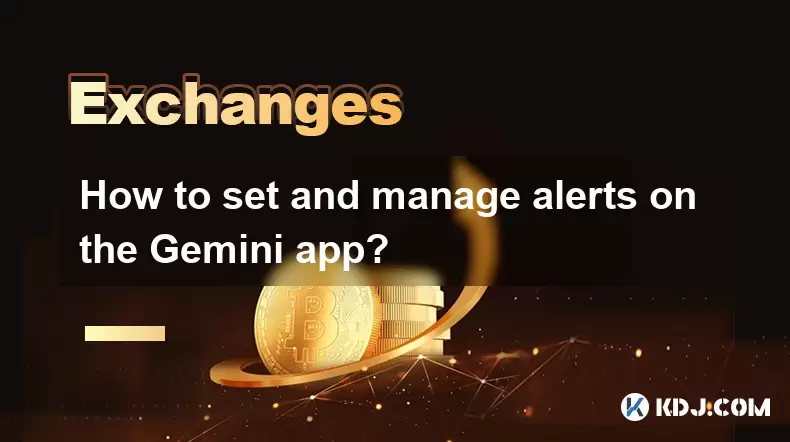
How to set and manage alerts on the Gemini app?
Aug 03,2025 at 11:00am
Understanding the Gemini App Alert SystemThe Gemini app offers users a powerful way to stay informed about their cryptocurrency holdings, price moveme...
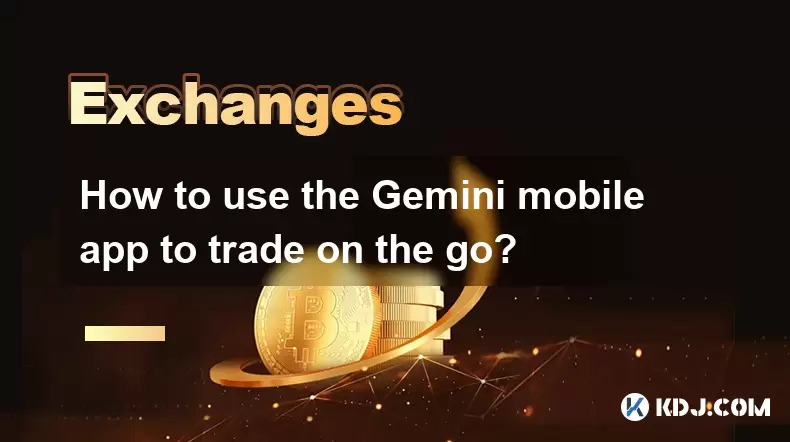
How to use the Gemini mobile app to trade on the go?
Aug 04,2025 at 09:14am
Setting Up the Gemini Mobile AppTo begin trading on the go using the Gemini mobile app, the first step is installing the application on your smartphon...
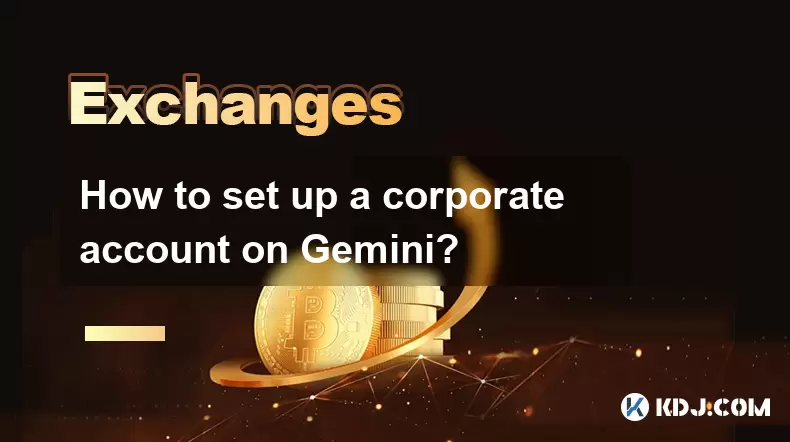
How to set up a corporate account on Gemini?
Aug 05,2025 at 03:29pm
Understanding Gemini Corporate AccountsGemini is a regulated cryptocurrency exchange platform that supports both individual and corporate account crea...
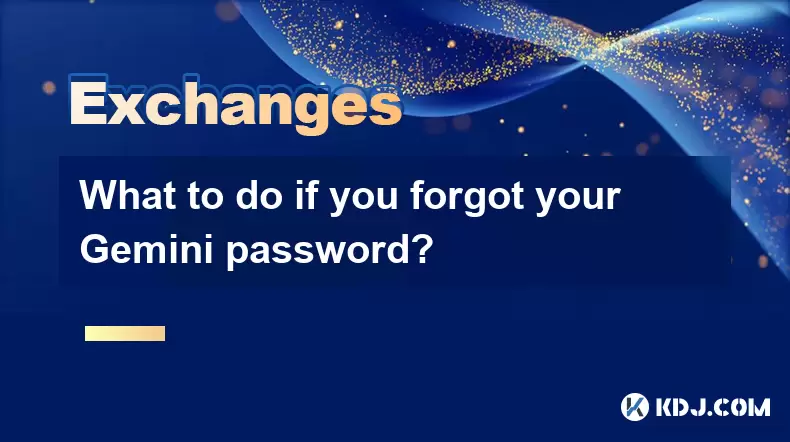
What to do if you forgot your Gemini password?
Aug 04,2025 at 03:42am
Understanding the Role of Passwords in Gemini AccountsWhen using Gemini, a regulated cryptocurrency exchange platform, your password serves as one of ...
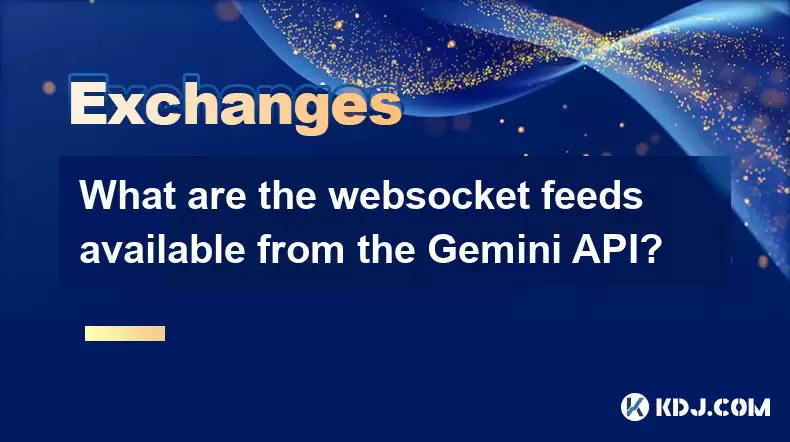
What are the websocket feeds available from the Gemini API?
Aug 03,2025 at 07:43pm
Overview of Gemini WebSocket FeedsThe Gemini API provides real-time market data through its WebSocket feeds, enabling developers and traders to receiv...
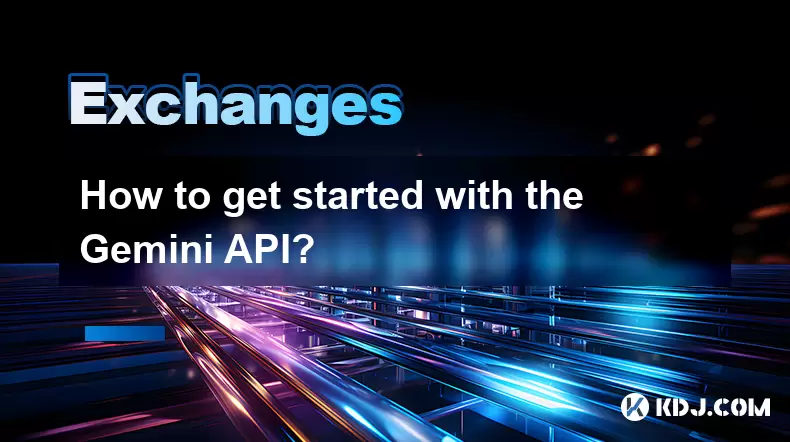
How to get started with the Gemini API?
Aug 05,2025 at 12:35pm
Understanding the Gemini API and Its PurposeThe Gemini API is a powerful interface provided by the cryptocurrency exchange Gemini, enabling developers...

How to set and manage alerts on the Gemini app?
Aug 03,2025 at 11:00am
Understanding the Gemini App Alert SystemThe Gemini app offers users a powerful way to stay informed about their cryptocurrency holdings, price moveme...

How to use the Gemini mobile app to trade on the go?
Aug 04,2025 at 09:14am
Setting Up the Gemini Mobile AppTo begin trading on the go using the Gemini mobile app, the first step is installing the application on your smartphon...

How to set up a corporate account on Gemini?
Aug 05,2025 at 03:29pm
Understanding Gemini Corporate AccountsGemini is a regulated cryptocurrency exchange platform that supports both individual and corporate account crea...

What to do if you forgot your Gemini password?
Aug 04,2025 at 03:42am
Understanding the Role of Passwords in Gemini AccountsWhen using Gemini, a regulated cryptocurrency exchange platform, your password serves as one of ...

What are the websocket feeds available from the Gemini API?
Aug 03,2025 at 07:43pm
Overview of Gemini WebSocket FeedsThe Gemini API provides real-time market data through its WebSocket feeds, enabling developers and traders to receiv...

How to get started with the Gemini API?
Aug 05,2025 at 12:35pm
Understanding the Gemini API and Its PurposeThe Gemini API is a powerful interface provided by the cryptocurrency exchange Gemini, enabling developers...
See all articles

























































































